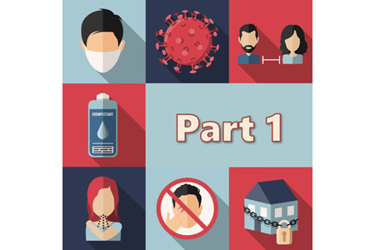The Long-Term Impact Of COVID-19 On Clinical Trials: Part 1
By James Gillespie, Ph.D., JD, MPA; John Whyte, MD, MPH; and Greg Licholai, MD, MBA

Pandemics provide a massive pressure-test of healthcare systems, allowing us to isolate what works well and what merits improvement. The COVID-19 pandemic is going to create a “new normal” regarding resetting the equilibrium in a variety of policies, procedures, and processes. Pandemics and other profound unexpected changes (i.e., so called black swan1 events, which are defined as the potential for dramatic impact of highly improbable events) serve to accelerate changes in business models and can create completely new categories of businesses. COVID-19 may cause fundamental alterations in how businesses compete. And because there will be unintended and unpredicted consequences of COVID-19, caution is warranted when making concrete predictions because there is significant uncertainty on how scenarios will play out. Once the outbreak is fully contained, many activities may revert back to normal, but many will be changed forever. The most lasting impact may be psychological as events such as these can produce transformative changes on beliefs, norms, and views, including for the life sciences industry and the drug development process. Interestingly, as measured by cost and length, the pre-pandemic environment for clinical trials has been described as unsustainable by many observers2, so this massive change also presents ripe opportunities for improvement.3
COVID’s Long-term Consequences On Clinical Trials: Patients and Processes
While COVID-19 will continue to have short- and medium-term impacts, the longer-term impact on clinical trials merits considerable attention, and it is our primary focus here. We discuss 11 key potential long-term consequences. In Part 1, we examine five factors that more directly impact the clinical trial process and patients. In Part 2, we examine six factors that focus on organizational structure and the broader industry.
Creating Efficiencies In The R&D And Regulatory Processes
COVID-19 has disturbed complacency, forcing changes in the legal, procedural, and regulatory dimensions of clinical trials.4 Every company can ask, “What would it look like to create a brand-new clinical trial process to compete with our existing process?” Many protocols are being modified to permit independent drug delivery and remote participant monitoring as companies pursue mitigation strategies. Without new, innovative approaches, clinical trial enrollment would drop precipitously, and there would be an adverse impact on investigator meetings, study monitor visits, and supplies of investigational drug products. Where possible, virtual interactions are being substituted for in-person study visits. There were — and there remain — valid reasons to do certain clinical related activities in-person. However, COVID-19 helped obliterate many of the artificial barriers, including organizational inertia and the inherent human aversion to change, that previously prevented widespread use of online modalities.
Because it accelerated the shift to virtual trials, COVID-19 could make our R&D system more efficient. In the immediate wake of COVID-19, the first fully virtual drug approval clinical trial was initiated for heart failure.5 Virtual/decentralized trials have long been advocated by clinical trial thought leaders and technology vendors given the positive impact on because of the positive potential impact on patients (e.g., convenience, safety, and reduced travel) and on sponsor companies (e.g., lower costs and increased efficiency). The urgency of the need to protect patients and salvage sites during the global pandemic has forced a real-time adoption. In turn, regulatory agencies — including the FDA, European EMCDDA, and Chinese CDE — are authorizing accelerated measure to increase the speed of drug development. Several medicines have already benefitted from these special emergency clinical trial review processes.
For the pharmaceutical industry, the question is flipping from “Why do this online?” to “Why not do this online?” — meaning the default presumption will be to do as many activities as possible virtually. Many CROs and pharmaceutical companies are now seeking to accelerate their use of virtual clinical trials and to apply those techniques to their portfolio of programs. Virtual clinical trials take significant time to conceptualize, design, plan, and implement. The home has been recast as a classroom, coffee shop, gym, office, and restaurant. To that list, we can perhaps add clinical trial site.
Leveraging Technology For Great Access, Improved Connectivity
There will be a greater use of telemedicine. In many areas, COVID-19 has overwhelmed the traditional, in-person healthcare system and taken telemedicine from lingering on the sidelines to the current default modality for non-priority cases. This saves commuting costs, time, and energy for patients, while also keeping them out of clinical environments that by definition are filled with unwell people. Historically, there has been resistance to telemedicine from some government regulators, insurance companies, and medical professionals. It is logical to assume in-person physician visits will remain a key part of medical treatment, but they will be increasingly reserved for the sickest patients. Remote office visits are likely to remain strong in popularity because telemedicine offers cost-control and high convenience. In addition, while yielding benefits in cost and convenience, telemedicine is often a more effective process for data collection than in-person doctor visits. The more people use telemedicine, the more they will appreciate its greater convenience and lower cost. COVID-19 will drive an increase of digital technologies, home testing (e.g., flu or high cholesterol), and telemedicine, and the biopharmaceutical industry is well positioned to be a pioneer in these technologies.
In the wake of the COVID-19 crisis, the FDA issued new guidance on clinical trials that is designed to heighten the safety of everyone involved, including trial participants and healthcare professionals, while maintaining data integrity. The agency is encouraging sponsors to use alternative methods such as phone calls, video conferencing, virtual visits, and greater use of local imaging centers and labs. To facilitate remote patient monitoring by healthcare providers, the FDA also promulgated a new policy permitting manufacturers to expand their distribution of approved non-invasive, devices for measuring vital signs, including for blood pressure, body temperature, heart rate, and respiratory rate. The Association of Clinical Research Organizations (ACRO) has recommended that CROs, hospitals, and sponsors implement and expand the use of digital tools such as e-diaries and electronic patient recorded outcomes (ePROs).
In a COVID-19 world, the biopharmaceutical industry is continuing and even accelerating its embrace of key, overlapping concepts such as connected devices, mobile platforms, remote patient monitoring (RPM), smartphones, telemedicine, and virtual clinical trials. These tools can facilitate effective clinical care while also maintaining public health and safety controls. RPM is proving particularly robust for managing the care of high-risk, infected, or unstable patients. In addition, virtual reality (VR) provides vivid experience even for someone isolated or quarantined. A VR program could allow those on clinical trial to communicate with, learn from, and socialize with others going through clinical trials, as well as provider staff such as PIs and clinical coordinators. The clinical trial participant could put on special VR glasses and instantly transcend to any number of environments, including classroom with information on the trial or a communal setting with other participants.
Artificial intelligence (AI) and machine learning (ML) were used extensively to predict COVID-19 spread and an individual’s probability of infection. Even after this current pandemic is contained, there will be the continuing threat of another potential outbreak from COVID-19 or another virus just over the horizon. There will likely be an increase in AI-driven monitoring, biometric surveillance, and movement tracking by government and by large technology companies, which raises some valid concerns. Some worry that we will become too reliant on technology and displace crucial human interaction, especially in the healthcare context. Many low-income people do not have access to broadband. How do we get everyone connected? Technology should enable not enfeeble. The industry also has to work to make sure social media remains social by facilitating rather than inhibiting human interaction.
Building Patient Trust
Driven by the pandemic itself, there have been heighted levels of residual anxiety, distrust, fear, and insecurity. As we move to being more connected digitally and more disconnected physically, trust becomes both more fragile and more important. In the wake of COVID-19, there perhaps should be greater emphasis placed on the more humanistic, “softer” approach of businesses interacting with customers, including enhanced empathy, honesty, transparency, and trust. There will be increased interest in group processes, organization culture, and team dynamics. It will be critical for patients to have access to data that is intuitive and trusted. In-person activities with patients should be made more interactive and intimate. To build trust and enhance respect, particularly in regard to clinical trials, life sciences companies must develop messaging that delivers relevant simple narratives bracketed by honesty and sincerity.
COVID-19 has exposed healthcare inequality in U.S. society. Prior to this pandemic, there was already a movement by the industry, by the FDA, and by patient advocates to make clinical trials more inclusive, particularly in terms of ethnicity and race. COVID-19 is likely to accelerate the trend given its highlighting of disparities regarding who gets exposed, tested, and treated. Socio-economic factors such as education, food, housing, jobs, nutrition, and transportation can often have a far greater impact on an individual’s health than biology, clinical care, or DNA. Addressing these social determinants of health was always recognized as crucial for reducing health disparities and improving health outcomes. Because it has disproportionately hit under-served communities and minority populations, COVID-19 is likely to punctuate the need for clinical trial diversity. For example, how can we ensure that no one is left behind in the exciting new world of virtual trials?
Making Clinical Research More Efficient
The economic sustainability of clinical trials has become a grave concern in recent years with the publication of reports suggesting that the cost to bring a single drug to market has risen to billions of dollars. The Tufts Center for the Study of Drug Development (CSDD) estimated that post-approval R&D costs were up to $2,870 million per drug.6 The study pointed out that low approval rates could be the culprit of these cost implications. According to CSDD, the overall chance that a drug entering clinical development will be approved for marketing was estimated to be just under 12%. In other words, seven out of eight compounds that enter the clinical testing pipeline will fail in development. Given these cost and approval issues, it may be unsurprising that the rate of return on pharmaceutical research and development investment dollars has been estimated to be only 3.2% annually.7 Part of the problem is that patients face multiple barriers such as logistical difficulties, travel challenges, or lack of appropriate information, in order to participate in clinical trials. That results in enrollment rates of only about 5% of eligible patients actual agreeing to sign up for research studies.8
Rethinking clinical research to incorporate the adoption of mobile health platforms (MHP), health information technology (HIT), including telecommunications, digitalization and other innovations has the potential to improve the cost crises in clinical trials. Decentralized clinical trials (DCTs), also called virtual, siteless or mobile trials, take advantage of technological advances in connected devices, mobile communications platforms and integrated electronic medical records (EMRs) with the goals of addressing costs, enrollment, and diversity issues. DCTs also have the potential for reducing costs and improving access to medical care through advances in technology platforms and mobile networks. Digital technologies can help make drug development more efficient by increasing the speed of enrollment, distributing information and getting more patients eligible to participate, and collecting data with better and cleaner methods. The cumulative effect is expected to be a reduction in development timelines leading to reduced trial costs.
Revisiting Issues Of Privacy And Security
COVID-19 is tilting the balance away from legacy players and toward innovators who have long argued for the greater leveraging of online tools. For example, this tragic pandemic is having the beneficial effect of forcing a revisiting of the limitations HIPAA places on electronic platforms such as email and video-teleconferencing, which are regularly used by many people for everyday communication. In many communities, nations, and organizations, COVID-19 has created a stronger sense of the collective whole versus the autonomous individual. While far from uniform, at many levels and in many spaces, there is a sense in which “we’re all in this together.” One can query the extent to which this spirit will persist, but on the margins at least, it may increase public demand for interventionist, maternalistic/paternalist measures to protect citizens. The pandemic is likely to make it less difficult to overcome privacy and cybersecurity concerns. There could be some degree of rebalancing of the mix between government activity and private market primacy, particularly regarding domains with the high public health component.
Surveillance is a tremendously useful tool for tracking and fighting the virus. The COVID-19 has highlighted the importance of data collection and data sharing. Apple and Google are embedding a feature into iPhones and Android devices that will facilitate tracking the virus. South Korea encouraged people in home quarantine to utilize self-diagnostic apps connecting them with healthcare clinicians. They also launched a series of robust apps and websites to share comprehensive information on the spread of COVID-19. A private company developed a mobile application that leverages government data to send alerts to users when they come within 100 meters of locations with high rates of infected people. Using that same publicly available data, a private citizen created an interactive map showing locations coronavirus people have visited and their demographic characteristics. This raises concerns for many regarding the potential to erode individual freedom and privacy. It is well beyond our scope here to weigh in on these considerations related to socio-political rights, but there are implications for clinical trials and patient-centricity.
Resources:
- On Robustness and Fragility, Deeper Philosophical and Empirical Reflections Book by Nassim Nicholas Taleb
- https://www.lifescienceleader.com/doc/it-seems-the-high-cost-of-drug-development-is-unsustainable-should-new-regulatory-pathways-be-considered-0001
- https://www.acpjournals.org/doi/full/10.7326/0003-4819-151-3-200908040-00126
- https://www.nejm.org/doi/full/10.1056/NEJMp2019989
- https://www.prnewswire.com/news-releases/janssen-leverages-wearable-technology-to-reimagine-clinical trial-design-300959419.html
- https://www.sciencedirect.com/science/article/abs/pii/S0167629616000291?via%3Dihub
- https://www2.deloitte.com/uk/en/pages/life-sciences-and-healthcare/articles/measuring-return-from-pharmaceutical-innovation.html
- https://www.ncbi.nlm.nih.gov/pmc/articles/PMC5495113/
About The Authors:
 James Gillespie, Ph.D., JD, MPA is an entrepreneur, executive, and researcher with expertise in the healthcare, life sciences, and technology sectors and extensive experience building collaborative stakeholder relationships across private, public, and NGO ecosystems. He is a research affiliate at the Yale School of Medicine’s Center for Digital Health Innovation, which develops, studies, and promotes digital innovations to improve lives and health, and he is an executive director at Sterling Bay, an innovative real estate development and investment firm. His education includes a Northwestern University Ph.D., Harvard University JD, and Princeton University MPA.
James Gillespie, Ph.D., JD, MPA is an entrepreneur, executive, and researcher with expertise in the healthcare, life sciences, and technology sectors and extensive experience building collaborative stakeholder relationships across private, public, and NGO ecosystems. He is a research affiliate at the Yale School of Medicine’s Center for Digital Health Innovation, which develops, studies, and promotes digital innovations to improve lives and health, and he is an executive director at Sterling Bay, an innovative real estate development and investment firm. His education includes a Northwestern University Ph.D., Harvard University JD, and Princeton University MPA.
 John Whyte, MD, MPH is a physician and author with a unique combination of government and private sector work that provides him with an exceptional perspective on wellness, clinical trials, information technology, innovation, and healthcare services. He has been a leading voice in addressing the COVID pandemic, being named as one of the top 20 health influencers. Dr. Whyte is also a major contributor to iterating digital platforms from simply providing content to playing a pivotal role in connecting to care. Dr. Whyte is a board-certified internist and continues to see patients. He completed an internal medicine residency at Duke University Medical Center as well as earned an MPH in health policy and management at Harvard University School of Public Health. Dr. Whyte was a health services research fellow at Stanford and attending physician in the Department of Medicine. He has written extensively in the medical and lay press, including numerous best-selling books.
John Whyte, MD, MPH is a physician and author with a unique combination of government and private sector work that provides him with an exceptional perspective on wellness, clinical trials, information technology, innovation, and healthcare services. He has been a leading voice in addressing the COVID pandemic, being named as one of the top 20 health influencers. Dr. Whyte is also a major contributor to iterating digital platforms from simply providing content to playing a pivotal role in connecting to care. Dr. Whyte is a board-certified internist and continues to see patients. He completed an internal medicine residency at Duke University Medical Center as well as earned an MPH in health policy and management at Harvard University School of Public Health. Dr. Whyte was a health services research fellow at Stanford and attending physician in the Department of Medicine. He has written extensively in the medical and lay press, including numerous best-selling books.
 Greg Licholai, MD, MBA is chief medical & innovation officer, and president of Symphony Health and Care Innovations at ICON plc. Dr. Licholai is on faculty of Yale School of Management, co-director of the Center for Digital Health, and teaches Innovating Healthcare at Harvard Business School. Previously, he was president of rare disease at Moderna Therapeutics and partner at McKinsey & Co. Dr. Licholai was educated at Harvard Business School, Yale School of Medicine, Columbia University, and Boston College. He trained in neurological surgery at the Brigham and Women's, Children's, and Massachusetts General hospitals. Dr. Licholai writes about innovation in healthcare for Forbes and his textbook Introduction to Medical Software: Foundations for Digital Health, Devices and Diagnostics is published by Cambridge University.
Greg Licholai, MD, MBA is chief medical & innovation officer, and president of Symphony Health and Care Innovations at ICON plc. Dr. Licholai is on faculty of Yale School of Management, co-director of the Center for Digital Health, and teaches Innovating Healthcare at Harvard Business School. Previously, he was president of rare disease at Moderna Therapeutics and partner at McKinsey & Co. Dr. Licholai was educated at Harvard Business School, Yale School of Medicine, Columbia University, and Boston College. He trained in neurological surgery at the Brigham and Women's, Children's, and Massachusetts General hospitals. Dr. Licholai writes about innovation in healthcare for Forbes and his textbook Introduction to Medical Software: Foundations for Digital Health, Devices and Diagnostics is published by Cambridge University.
